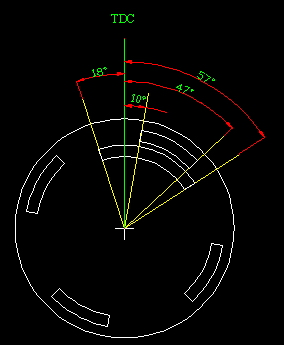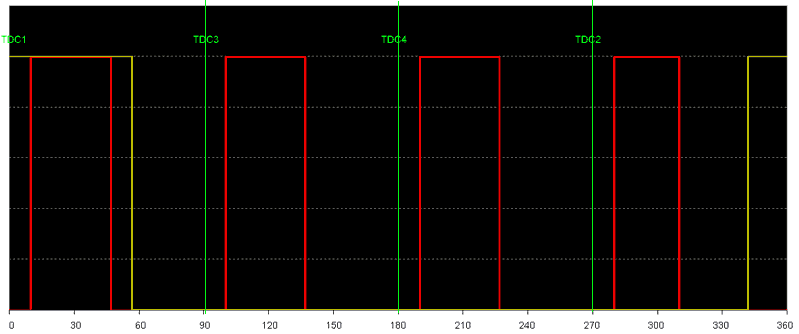This tutorial is written to explain all the trigger setup variables for the 1.1.x series of firmware. There are two general types of trigger schemes, those that rely on a missing teeth to identify the wheel position and those that do not. This document deals with the latter.
The examples here are taken from a Mazda 1.8l 4 cylinder BP engine's trigger scheme. With the settings here it should be trivial to make changes and adapt the configuration to variants of this scheme.
First the Mazda distributor contains a disc with slots as follows:

This camwheel rotates counterclockwise and is triggered via hall type sensor. This means either rising or falling edge pulses are appropriate.
Looking closely at this wheel the waveform of a running engine will look like this graphed according to degrees of rotation on the cam. Since the crank rotates at twice the speed this graph also represents two complete crank revolutions.

Dissecting the data presented here a number of details can be determined. Note that unless otherwise noted all measurements are expressed in degrees of cam rotation. Here, the primary pulse occurs 4 times per engine period and the secondary trigger only once.
- The rising edge of any primary trigger occurs 80 degrees before TDC on the next cylinder.
- The falling edge of any primary trigger occurs 33 degrees before TDC on the next cylinder.
- The rising edge of the secondary pulse occurs 18 degrees before TDC1
- The falling edge of the secondary pulse occurs 57 degrees after TDC1 and 43 degrees before TDC3.
Since these measurements are in cam degrees they are 1/2 of the crank measurement. This engine will never require 66 crank degrees of advance so we can use the falling edge of the primary trigger. Since this signal will occur closer to the actual engine event it will be slightly more accurate when the RPM is not constant.
First the trigger types must be configured:
primary_trigger
secondary_trigger